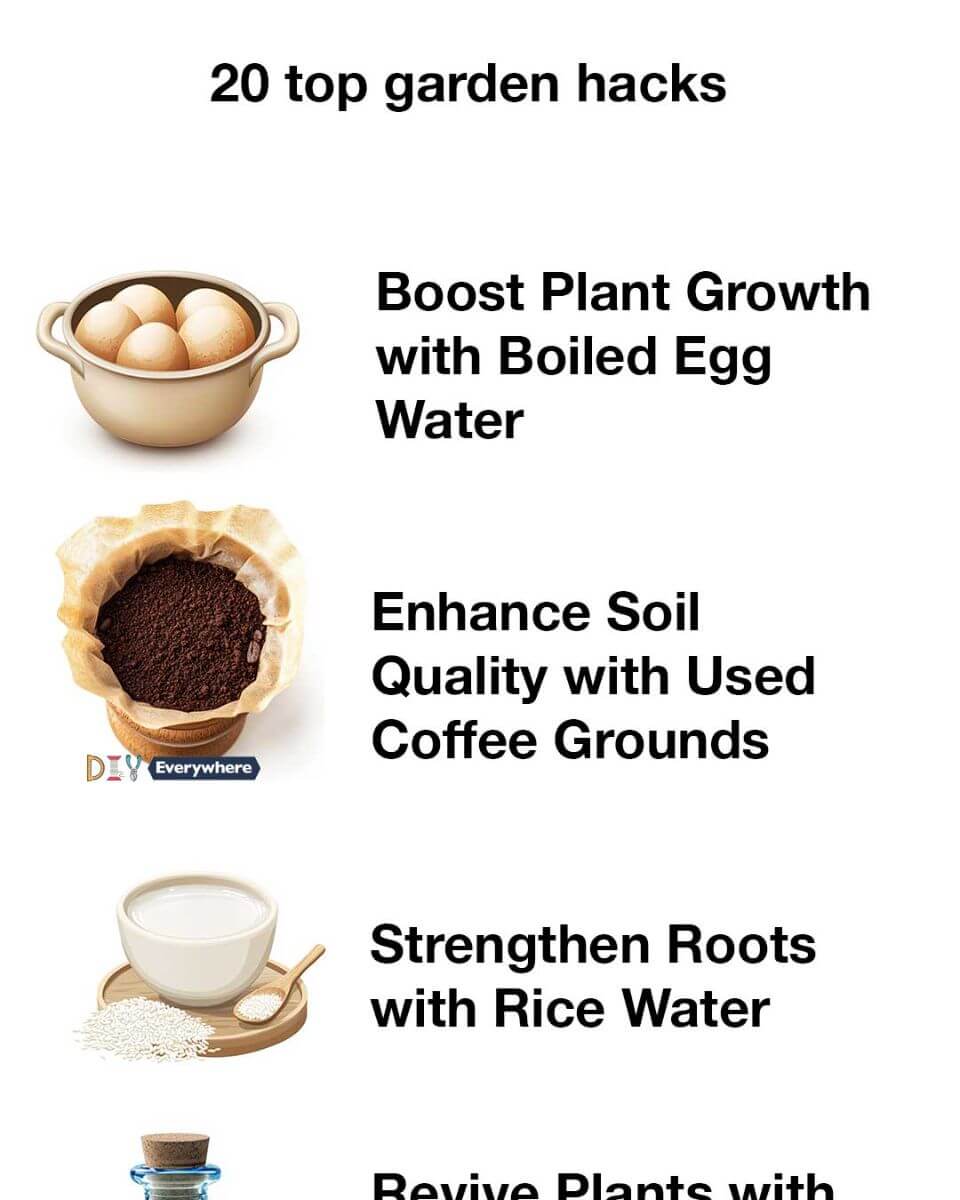Gardening blends creativity, patience, and knowledge, making it both an art and a science. Whether you’re a beginner or an experienced gardener, simple hacks can streamline your tasks, enhance plant health, and improve yields. Many of these techniques use common household items, making them cost-effective and environmentally friendly. By integrating these strategies into your gardening routine, you can achieve a flourishing garden with minimal effort.
Why Gardening Hacks Are Beneficial
Utilizing gardening hacks comes with numerous advantages, such as cost savings, sustainable practices, and healthier plants. Repurposing household waste like eggshells or coffee grounds reduces waste while improving soil quality. Natural alternatives like homemade fertilizers and pest sprays eliminate the need for chemicals, fostering a balanced ecosystem. Additionally, these simple yet effective tricks make gardening more efficient and enjoyable.
1. Use Eggshell Water to Boost Plant Growth
After boiling eggs, let the water cool and use it to water your plants. This calcium-rich liquid strengthens plant cell walls and encourages robust growth.
2. Improve Soil with Used Coffee Grounds
Adding used coffee grounds to your soil enhances aeration, improves drainage, and increases nitrogen levels. Simply sprinkle them around plants or mix them into the soil for a natural boost.
3. Strengthen Roots with Rice Water
The starchy water left after rinsing rice is packed with essential nutrients. Use it to water your plants regularly to support root development and overall health.
4. Revitalize Plants with Hydrogen Peroxide
Hydrogen peroxide oxygenates soil and combats root rot. Mix one part hydrogen peroxide with ten parts water and use it to water your plants for a healthier root system.
5. Keep Pests at Bay with Neem Oil
Neem oil is a natural insect repellent that disrupts pests’ life cycles without harming beneficial insects. Mix it with water and a few drops of dish soap for an effective spray against aphids and spider mites.
6. Create Nutrient-Rich Soil with Composting
Composting kitchen and garden waste, such as fruit peels and grass clippings, produces a natural fertilizer that enriches soil and fosters plant health.
7. Retain Moisture with Mulching
Applying mulch, such as straw or wood chips, helps regulate soil temperature, conserve moisture, and suppress weeds. As mulch decomposes, it also enriches the soil with nutrients.
8. Utilize Companion Planting for Natural Pest Control
Certain plants, when grown together, support each other’s growth and deter pests. For example, marigolds protect tomatoes from nematodes, while basil improves their flavor and repels flies.
9. Fertilize with Banana Peels
Banana peels are rich in potassium, phosphorus, and calcium. Bury chopped peels in the soil near plants or soak them in water to create a nutrient-packed fertilizer tea.
10. Use Epsom Salt for Lush Foliage
Epsom salt contains magnesium, which is vital for photosynthesis. Dissolve it in water and use it every few weeks to promote greener leaves and healthier blooms.
11. DIY Drip Irrigation for Water Efficiency
Make a simple irrigation system by burying a plastic bottle with small holes near plant roots. This slow-release watering method maintains consistent soil moisture.
12. Enrich Soil with Crushed Eggshells
Eggshells provide a slow-release calcium source for plants, preventing blossom end rot in tomatoes and peppers. Crush them and mix them into the soil or scatter them on the surface.
13. Control Weeds with Vinegar
The acetic acid in vinegar naturally dries out weeds. Spray undiluted vinegar directly onto weeds on a sunny day for an effective, chemical-free weed killer.
14. Prevent Fungal Growth with Cinnamon
Cinnamon has natural antifungal properties that protect seedlings from damping-off disease. Lightly dust cinnamon over the soil when planting seeds to reduce fungal infections.
15. Sweeten Tomatoes with Baking Soda
Sprinkling baking soda around tomato plants reduces soil acidity, resulting in sweeter fruit. This hack is especially useful in highly acidic soil conditions.
16. Keep Pests Away with Garlic Spray
Garlic spray repels insects like aphids and caterpillars. Blend garlic with water, strain the mixture, and apply it to your plants to naturally deter pests.
17. Boost Plant Nutrition with Fish Emulsion
Fish emulsion is an organic fertilizer rich in nitrogen, phosphorus, and potassium. Dilute it with water and feed your plants every few weeks for optimal growth.
18. Stimulate Root Growth with Aloe Vera
Aloe vera gel serves as a natural rooting hormone. Dip plant cuttings in aloe vera gel before planting to encourage strong root development and protect against pathogens.
19. Enhance Growth with Seaweed Extract
Seaweed extract is packed with essential micronutrients that improve stress tolerance, root development, and plant health. Dilute with water and apply as a foliar spray or soil drench.
20. Harvest Rainwater for Sustainable Gardening
Collect rainwater in a barrel to provide chemical-free hydration for your plants. This eco-friendly practice reduces water bills and ensures a sustainable water source for your garden.
Conclusion: Unlock Your Garden’s Full Potential
By incorporating these gardening hacks, you can optimize plant growth, reduce maintenance efforts, and embrace sustainable practices. Whether it’s improving soil, controlling pests, or boosting plant nutrition, these simple yet powerful techniques contribute to a thriving garden. Try these hacks today and enjoy the rewards of a healthier, more productive garden.
